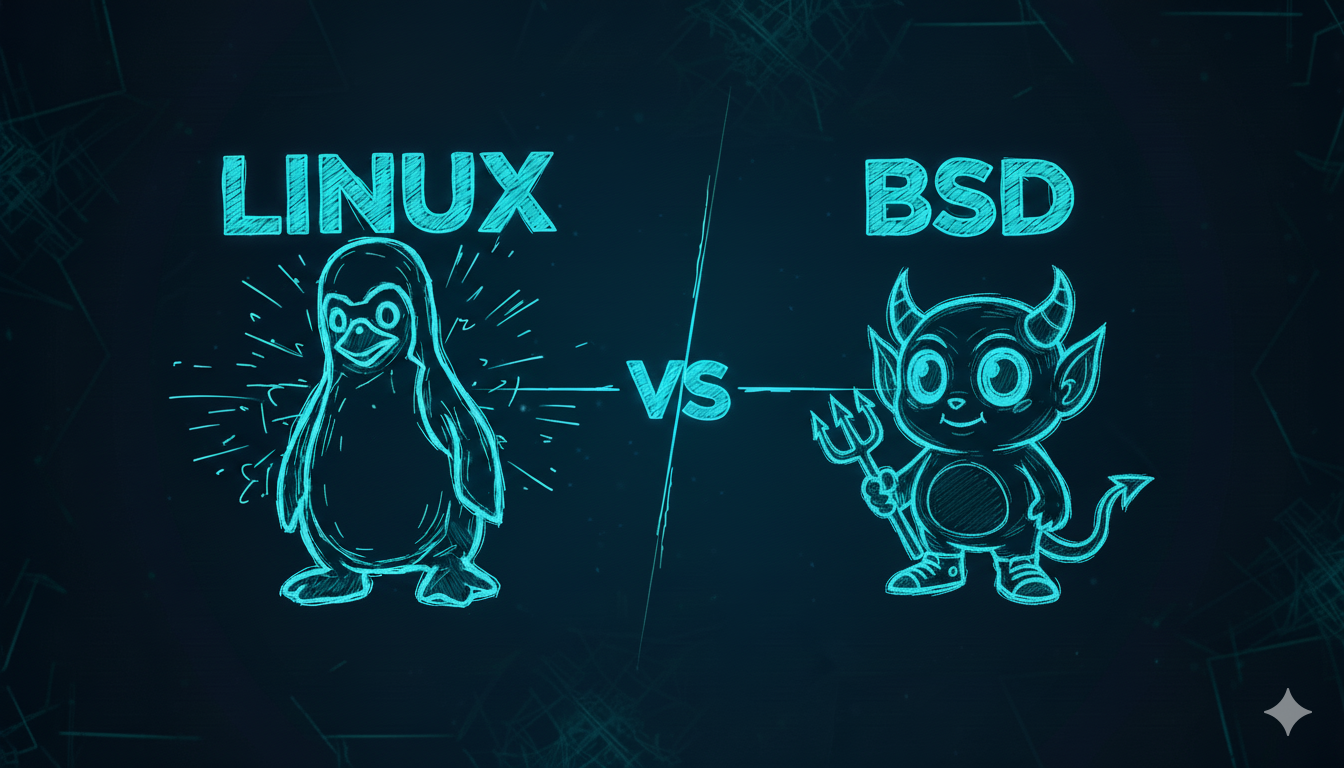Linux Vs BSD

Main Difference#
Mostly we use Linux as an open source OS, but Linux is a kernel, not a full-fledged OS. On the other side, BSD family OS such as FreeBSD, OpenBSD, NetBSD, etc., are full-fledged operating systems, not just kernel or kernel-centric OS.
Linux vs BSD#
Both systems are based on UNIX and both use Monolithic Kernels. Linux itself is a kernel that comes with different drivers. What we use as “Linux” is actually a Linux-based OS/distro such as Ubuntu, Arch Linux, Fedora, etc.
Most Linux-based distros use GNU utilities, which provide system tools such as systemctl, gcc, ls, cp, mv, etc., and also use desktop environments like GNOME, KDE Plasma, LXDE, etc.
Linux OS is made from:#
- Linux Kernel (Core)
- System Utils (mostly from GNU)
- Desktop Environment (GNOME, KDE Plasma, etc.)
On the other side, BSD-based OS (FreeBSD, OpenBSD, NetBSD, etc.) are full-fledged operating systems, not just a kernel like Linux. BSD OS have their own utilities and don’t need tools from other sources like GNU. However, most BSD-based OS are CLI-based, so they don’t come with a desktop environment by default. But some desktop environments like GNOME, KDE Plasma, and others have support or ports for BSD OS.
BSD OS is not just a kernel—it also comes with utilities and system tools. But Linux itself is just a kernel; Linux distros are OS that use the Linux kernel and utilities from other sources.
Hardware Support#
Linux has much better hardware support than BSD OS. BSD has lesser hardware support, but it is improving.
Use Cases#
Linux is used as an open source operating system by many organizations and people. It’s used for daily work as an alternative to Windows and macOS because it has great driver support.
BSD OS are mostly used in servers. Many enterprises use BSD OS to host server programs or applications such as WhatsApp and Netflix.
Even the Darwin kernel (used in macOS and iOS) is based on BSD. The Orbis OS (PlayStation OS) is also based on BSD (FreeBSD 9, not FreeBSD 6).
Performance#
Performance depends on their use cases. BSD is best for network applications like streaming, messaging, HTTP, SMTP, etc. BSD doesn’t have system utilities overhead like Linux—all tools come integrated with BSD OS. However, it has less driver support than Linux. Sometimes drivers are available in BSD but not updated, which can slow down BSD performance. Basically, neither BSD nor Linux is universally faster than the other; it depends on use cases.
Foundation#
Linux was founded by Linus Torvalds. It was a side project of Linus Torvalds in the early days.
Original BSD was a series of Unix operating systems developed at the University of California, Berkeley, led by Bill Joy. Nowadays we use BSD-based OS, not the original BSD, because the original BSD has been discontinued.
License#
Linux comes with GPLv2 (GNU General Public License, Version 2), and BSD OS come with mostly BSD-based licenses such as 2-Clause BSD License. Both licenses support open source.